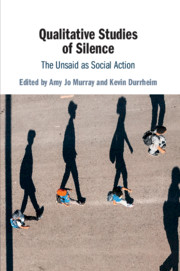Book contents
- Qualitative Studies of Silence
- Qualitative Studies of Silence
- Copyright page
- Dedication
- Contents
- Figures
- Contributors
- Acknowledgments
- Introduction: A Turn to Silence
- 1 Literal and Metaphorical Silences in Rhetoric: Examples from the Celebration of the 1974 Revolution in the Portuguese Parliament
- 2 Seeing Silenced Agendas in Medical Interaction: A Conversation Analytic Case Study
- 3 Listening to the Sound of Silence: Methodological Reflections on Studying the Unsaid
- 4 Social Silences: Conducting Ethnographic Research on Racism in the Americas
- 5 Intimate Silences and Inequality: Noticing the Unsaid through Triangulation
- 6 Silence in the Court: Moral Exclusion at the Intersection of Disability, Race, Sexuality, and Methodology
- 7 Silencing Self and Other through Autobiographical Narratives
- 8 Gendering the Unsaid and the Unsayable
- 9 The Language Ideology of Silence and Silencing in Public Discourse
- 10 Propaganda by Omission: The Case of Topical Silence
- 11 Silencing Whistleblowers
- 12 Between Sound and Silence: The Inaudible and the Unsayable in the History of the First World War
- 13 Affect and the Unsaid: Silences, Impasses, and Testimonies to Trauma
- 14 The Unsaid and the Unheard
- 15 Conclusion: Topographies of the Said and Unsaid
- Index
- References
13 - Affect and the Unsaid: Silences, Impasses, and Testimonies to Trauma
Published online by Cambridge University Press: 30 June 2019
- Qualitative Studies of Silence
- Qualitative Studies of Silence
- Copyright page
- Dedication
- Contents
- Figures
- Contributors
- Acknowledgments
- Introduction: A Turn to Silence
- 1 Literal and Metaphorical Silences in Rhetoric: Examples from the Celebration of the 1974 Revolution in the Portuguese Parliament
- 2 Seeing Silenced Agendas in Medical Interaction: A Conversation Analytic Case Study
- 3 Listening to the Sound of Silence: Methodological Reflections on Studying the Unsaid
- 4 Social Silences: Conducting Ethnographic Research on Racism in the Americas
- 5 Intimate Silences and Inequality: Noticing the Unsaid through Triangulation
- 6 Silence in the Court: Moral Exclusion at the Intersection of Disability, Race, Sexuality, and Methodology
- 7 Silencing Self and Other through Autobiographical Narratives
- 8 Gendering the Unsaid and the Unsayable
- 9 The Language Ideology of Silence and Silencing in Public Discourse
- 10 Propaganda by Omission: The Case of Topical Silence
- 11 Silencing Whistleblowers
- 12 Between Sound and Silence: The Inaudible and the Unsayable in the History of the First World War
- 13 Affect and the Unsaid: Silences, Impasses, and Testimonies to Trauma
- 14 The Unsaid and the Unheard
- 15 Conclusion: Topographies of the Said and Unsaid
- Index
- References
Summary
This chapter examines the affective dimension of the unsaid. It proposes an affective approach to understanding, researching, and writing the unsaid by outlining and utilizing two distinct yet resonate methodologies, grounded in the research practices of each author. In doing so, the chapter shows how different methodological approaches to the challenge of writing the unsaid offer an unfolding of potentials for how silence might speak without words. The chapter begins with a brief account of affect studies in the humanities before detailing a methodology of affective witnessing to the silence of political violence, followed by an examination of the relations between silence and the body in the unsaid of sexual abuse and the problem of writing in the face of blockages to speaking. In closing, it considers in more general terms what affective methodologies might bring to qualitative research into the unsaid.
- Type
- Chapter
- Information
- Qualitative Studies of SilenceThe Unsaid as Social Action, pp. 236 - 253Publisher: Cambridge University PressPrint publication year: 2019
References
- 2
- Cited by

